New York Overtime Law Ultimatum Spells Disaster for Agriculture

With nearly 4,000 dairy farms that produce more than 15 billion pounds of milk annually, New York ranks fourth in the nation for milk production. If the recent state board recommendations are approved by the state labor commissioner, New York will also rank alongside California and Washington state in phasing in a 40-hour overtime threshold.
Two years ago, New York passed a law for agriculture employers to pay overtime after a 60-hour workweek.
The panel voted 2-to-1 late last week, that would reduce overtime to a 40-hour workweek by 2032. The threshold would drop four hours per week every two years beginning in 2024.
After hundreds of testimonies, the vote came quickly and farmers are heavily concerned what the detrimental impact will be to their farms if this is passed by the state labor commissioner.
Located 30 miles east of Buffalo, New York dairy producers, Tyler and Kelly Reynolds of Reyncrest Farms, anxiously awaited the proposed ultimatum, knowing if passed some of their current employees would find work elsewhere.
Now the overtime decision is in the hands of New York’s governor and wage commissioner. “While this is not a ‘done deal,’ it’s not looking good for us farmers,” Kelly says.
“For me, it’s disheartening after resounding testimony from those involved in agriculture, owners and farm workers alike, were against the move to 40-hours and the wage board still decided in favor of lowering the threshold,” she remarks. “When people who have never milked a cow or picked an apple or hired a farm employee are deciding the future of agriculture in our state, it’s a scary thing.”
As third-generation dairy farmers, the Reynolds milk 1,400 cows and farm 2,700 acres alongside family. They have 15 employees and an additional 6-7 employees for general farm labor to help with cropping. Currently, Reyncrest operates 11-hour shifts, six days a week for their employees. “Our employees really don’t want to work less than 66-70 hours a week,” Kelly shares.
Worries mount as New York’s minimum wage increased on January 1 from $12.50 to $13.20. “So, we are already struggling with that increase,” Kelly notes.
A recent report released by Cornell University’s College of Agriculture and Life Sciences projects many farms across the state will be forced to close or shrink their enterprises if the 40-hour week for farmworkers is implemented.
At Reyncrest, the Reynolds are already thinking they might have to turn to automation, but for now, they are not sure that is the route they want to head to right away.
Grow New York Farms, an agency that represents the agricultural interests of many New York farmers, shared a statement stating, “Despite 70% of the testimony made by farmers and farm workers who asked for overtime to stay at 60, it is disingenuous and irresponsible that the data, research, and comments made from those who know agriculture best were cast aside by the majority of the Wage Board. Changing the overtime threshold to 40 hours a week for farmworkers in New York means that these workers will be limited to 40 hours, due to simple farm economics. This is not a win for farmworkers that self-proclaimed worker advocates will claim. Agricultural production, diversification, and job availability will suffer. That is no scare tactic. We have already seen farmworkers leave the state for more hours of work and production shift to less labor-intensive crops since the farm labor legislation was enacted in January 2020. Further collapse of New York agriculture is on the hands of those who spread falsehoods and look to destroy the livelihoods of farmworkers they say they represent. This is also a loss for New Yorkers who enjoy and depend on access to local food, something that was highlighted during the pandemic.”







